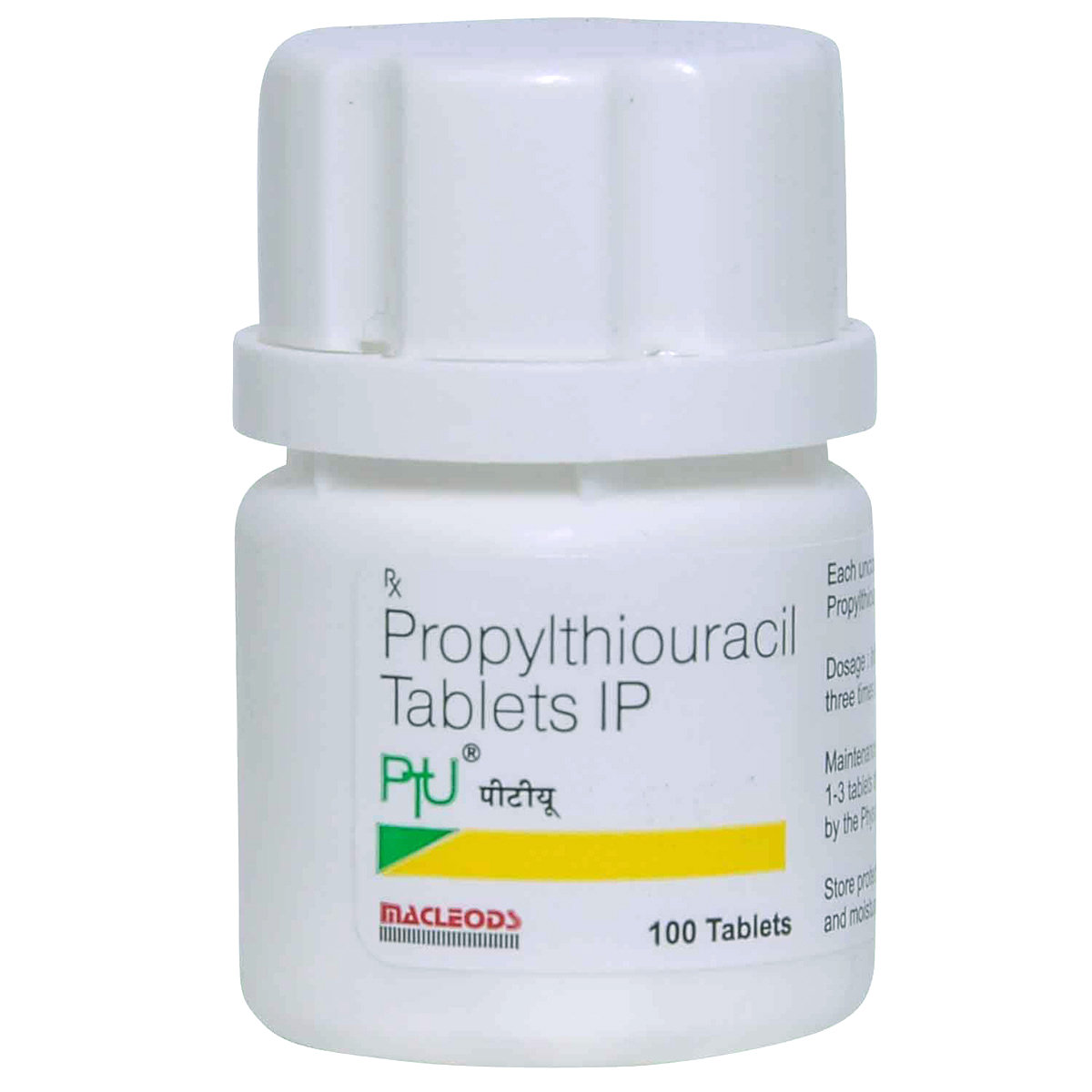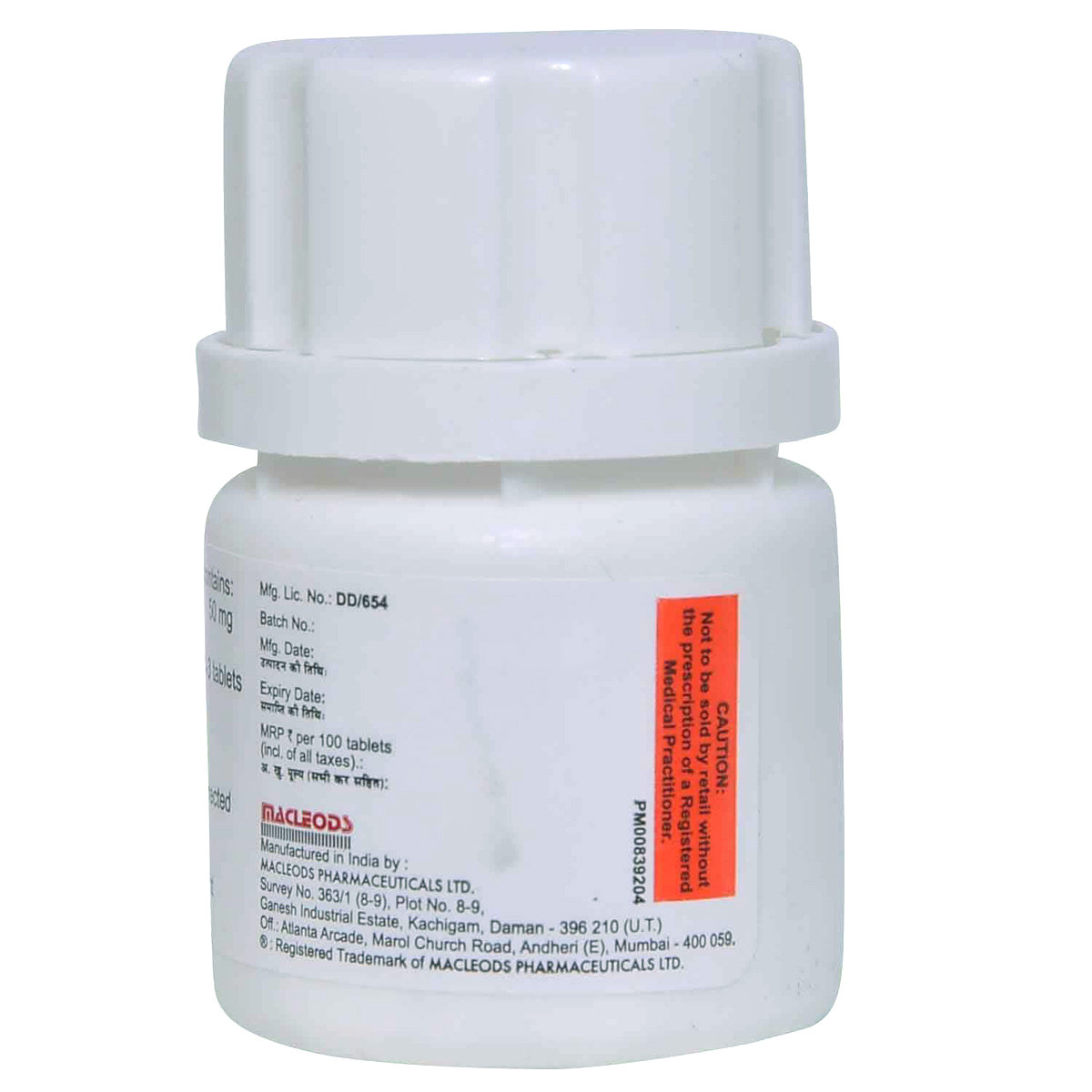PTU Tablet 100's
MRP ₹897
(Inclusive of all Taxes)
₹134.6 Cashback (15%)
Provide Delivery Location
Online payment accepted
 Prescription drug
Prescription drugWhats That
Composition :
Manufacturer/Marketer :
Consume Type :
Expires on or after :
Return Policy :
About PTU Tablet
PTU Tablet belongs to the group of anti-thyroid drugs used in the treatment of overactive thyroid (hyperthyroidism), Grave’s disease, thyrotoxicosis, and enlarged thyroid (toxic goitre). PTU Tablet may also be used to lower very high levels of thyroid hormone prior to surgery or radioactive iodine treatment.
PTU Tablet contains 'Propylthiouracil' that regulates the synthesis and release of thyroid hormones by mellowing down the activity of the thyroid gland.
Take PTU Tablet as prescribed. In some cases, PTU Tablet may cause side effects such as nausea, indigestion, headache, body pain or a mild rash. Most of these side effects do not require medical attention and will resolve gradually over time. However, you are advised to talk to your doctor if these side effects persist.
It is advisable to inform the doctor if you are allergic to any of the components of PTU Tablet . Keep your doctor informed if you suffer from any autoimmune disorders, blood disorders or liver disease. Consult your doctor if you are pregnant, planning to get pregnant, or if you are breastfeeding. PTU Tablet may cause dizziness, so drive only if you are alert.
Uses of PTU Tablet
Directions for Use
Key Benefits
PTU Tablet is an anti-thyroid drug used to treat hyperthyroidism and diseases that produce an overactive thyroid. It contains propylthiouracil. PTU Tablet works by inhibiting the formation of new thyroid hormones, thereby regulating the amount of thyroid hormone in the body and slowing down the thyroid gland that was otherwise in overdrive. Hence, PTU Tablet helps in treating and controlling the symptoms of excess thyroid hormone in the body, including anxiety, palpitation, a racing heartbeat, swelling in the neck (goitre), and weight loss. PTU Tablet may also be used to lower very high levels of thyroid hormone prior to surgery or radioactive iodine treatment.
Storage
Drug Warnings
It is advisable to inform the doctor if you are allergic to any of the components of PTU Tablet . Keep your doctor informed if you suffer from any autoimmune disorders, blood disorders or liver disease. Consult your doctor if you are pregnant, planning to get pregnant, or if you are breastfeeding. Inform your doctor if you have recently had any surgery or are about to undergo surgery or a dental procedure.
Drug-Drug Interactions
Drug-Drug Interactions
Login/Sign Up
Combining PTU Tablet with Clozapine can increase the risk of infection.
How to manage the interaction:
Taking PTU Tablet with Clozapine together can possibly result in an interaction, but it can be taken if your doctor has advised it. However, consult the doctor immediately if you experience symptoms such as fever, chills, diarrhea, sore throat, muscle aches, and pain during urination. Do not stop using any medications without a doctor's advice.
Coadministration of Ketoconazole and PTU Tablet may increase the risk of liver problems.
How to manage the interaction:
Although taking Ketoconazole and PTU Tablet together can result in an interaction, it can be taken if a doctor has prescribed it. However, if you experience fever, chills, joint pain, itching, abdominal pain, dark urine, light stools, and/or yellowing of the skin or eyes, consult a doctor immediately. Do not stop using any medications without talking to a doctor.
Coadministration of Teriflunomide with PTU Tablet can increase the risk of liver problems.
How to manage the interaction:
There may be a possibility of interaction between PTU Tablet and Teriflunomide, but it can be taken if prescribed by a doctor. However, if you experience any symptoms such as fever, chills, joint pain, itching, tiredness, abdominal pain, dark urine, light stools, and yellowing of the skin or eyes, consult a doctor immediately. Do not stop using any medications without first talking to your doctor.
Taking PTU Tablet with carbamazepine can increase the risk of side effects.
How to manage the interaction:
Although there is an interaction between PTU Tablet and Carbamazepine, you can take these medicines together if prescribed by your doctor. Do not stop using any medications without first talking to your doctor.
Coadministration of Fluphenazine with PTU Tablet can increase the risk of developing infections.
How to manage the interaction:
Co-administration of PTU Tablet with Fluphenazine can possibly result in an interaction, but it can be taken if your doctor has advised it. However, contact a doctor if you experience any symptoms such as fever, chills, diarrhea, sore throat, muscle aches, shortness of breath, or burning urination. Do not discontinue any medications without first consulting your doctor.
Coadministration of Mipomersen with PTU Tablet can increase the risk of liver problems.
How to manage the interaction:
Taking PTU Tablet with Mipomersen together can result in an interaction, but it can be taken if your doctor has advised it. However, if you experience any symptoms such as fever, chills, joint pain, tiredness, abdominal pain, dark urine, light stools, and/or yellowing of the skin or eyes, consult a doctor immediately. Do not discontinue any medications without first consulting your doctor.
Coadministration of lomitapide with PTU Tablet can increase the risk of liver problems.
How to manage the interaction:
Although there is a possible interaction between PTU Tablet and Lomitapide, you can take these medicines together if prescribed by your doctor. However, if you experience any symptoms such as fever, chills, joint pain, itching, tiredness, abdominal pain, dark urine, light stools, and/or yellowing of the skin or eyes, consult a doctor immediately. Do not discontinue any medications without first consulting a doctor.
Taking PTU Tablet with Methimazole can increase the risk of side effects.
How to manage the interaction:
Co-administration of PTU Tablet with Methimazole can possibly result in an interaction, but it can be taken if your doctor has advised it. Do not discontinue any medications without consulting a doctor.
Taking PTU Tablet with leflunomide can increase the risk of liver problems.
How to manage the interaction:
Co-administration of Leflunomide with PTU Tablet can possibly result in an interaction, but they can be taken together if prescribed by a doctor. However, if you experience fever, chills, joint pain, unusual bleeding, itching, fatigue, abdominal pain, or yellowing of the skin or eyes, contact a doctor immediately. Do not discontinue any medications without consulting a doctor.
Coadministration of Deferiprone with Clozapine can increase the risk of infection.
How to manage the interaction:
Although there is a possible interaction between PTU Tablet and Deferiprone, you can take these medicines together if prescribed by your doctor. However, contact a doctor if you experience any symptoms of infection, such as fever, chills, diarrhea, sore throat, muscle aches, or burning during urination. Do not discontinue any medications without first consulting your doctor.
Drug-Food Interactions
Drug-Food Interactions
Login/Sign Up
Diet & Lifestyle Advise
- Stick to a low-iodine diet to regulate the level of thyroid hormones in your body.
- Opt for non-iodised salt, tea, egg whites, honey, maple syrup, fresh fruits, potatoes, and cauliflower to lower the iodine levels in your diet.
- Make sure your intake of calcium, vitamin D, zinc, iron and selenium is adequate as these are very important in maintaining thyroid health. Have healthy fats, lean meats, green leafy vegetables and oily fish to regulate thyroid functioning.
- Limit alcohol and caffeine consumption and stop smoking as these may have a negative effect on health.
- One of the symptoms of hyperthyroidism is anxiety and stress. Keep your mind at peace by regularly practising meditation.
- Doing yoga can also be effective in controlling your thyroid hormones and keeping them in check.
Side Effects of PTU Tablet
- Nausea
- Stomach upset
- Vomiting
- Muscle pain
- Rash
- Hair loss
Habit Forming
Therapeutic Class
All Substitutes & Brand Comparisons
Drug-Diseases Interactions
Drug-Diseases Interactions
Login/Sign Up
FAQs
Drug-Drug Interactions Checker List
- WARFARIN
- COUMADIN
- DIGOXIN
- THEOPHYLLINE
- AMINOPHYLLINE
- IODINE
Special Advise
- If you accidentally take extra doses of PTU Tablet , please inform your doctor or go to a hospital immediately. Some of the symptoms of an overdose can be rash, itching, sudden hair loss, feeling sick, dizziness, mood changes, loss of taste, ear pain, blurring of vision, headache.
- Do not discontinue taking PTU Tablet abruptly or without the advice of the physician.
- Please know that your doctor may order blood tests to check your tolerance and need of PTU Tablet .
Disease/Condition Glossary
Hyperthyroidism: Hyperthyroidism refers to an overactive thyroid that pumps high levels of thyroid hormones into the body, leading to rapid heartbeat, weight loss, bulging eyes, sweating, anxiety, palpitations etc.
Grave’s disease: It is an autoimmune condition that produces hyperthyroidism.
Toxic goitre: It involves an enlarged thyroid gland with nodules and produces excess thyroid hormone.
Thyrotoxicosis: It is a condition in which the thyroid hormone levels are dangerously high.

Have a query?
Alcohol
Safe if prescribed
Not enough studies exist to establish the effects of alcohol on PTU Tablet . However, caution is advised. Please consult your doctor if you have any concerns.
Pregnancy
Consult your doctor
Please consult your doctor if you are pregnant or planning to become pregnant. Your doctor will prescribe only if the benefits outweigh the risks.
Breast Feeding
Consult your doctor
PTU Tablet is safe if prescribed during breastfeeding. Please consult a doctor if you have any concerns.
Driving
Safe if prescribed
If you experience any side effects of PTU Tablet such as dizziness or drowsiness, do not drive.
Liver
Consult your doctor
Exercise caution before using PTU Tablet in case of established liver disease. Please consult your doctor to address any concerns.
Kidney
Consult your doctor
PTU Tablet is probably safe on the kidney. Please consult your doctor to address any concerns.
Children
Safe if prescribed
PTU Tablet is not recommended for use in children below 6 years of age. Please consult your doctor if you have any concerns.







